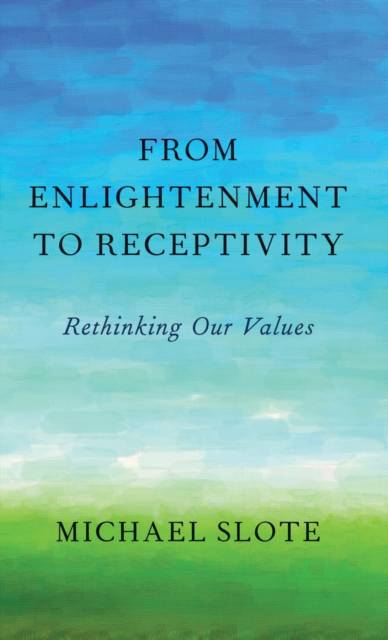
Wil je zeker zijn dat je cadeautjes op tijd onder de kerstboom liggen? Onze winkels ontvangen jou met open armen. Nu met extra openingsuren op zondag!
- Afhalen na 1 uur in een winkel met voorraad
- Gratis thuislevering in België vanaf € 30
- Ruim aanbod met 7 miljoen producten
Wil je zeker zijn dat je cadeautjes op tijd onder de kerstboom liggen? Onze winkels ontvangen jou met open armen. Nu met extra openingsuren op zondag!
- Afhalen na 1 uur in een winkel met voorraad
- Gratis thuislevering in België vanaf € 30
- Ruim aanbod met 7 miljoen producten
Zoeken
€ 96,45
+ 192 punten
Uitvoering
Omschrijving
This new book by Michael Slote argues that Western philosophy on the whole has overemphasized rational control and autonomy at the expense of the important countervailing value and virtue of receptivity. Recently the ideas of caring and empathy have received a great deal of philosophical and public attention, but both these notions rest on the deeper and broader value of receptivity, and in From Enlightenment to Receptivity, Slote seeks to show that we need to focus more on receptivity if we are to attain a more balanced sense and understanding of what is important to us. Beginning with a critique of Enlightenment thinking that calls into question its denial of any central role to considerations of emotion and empathy, he goes on to show how a greater emphasis on these factors and on the receptivity that underlies them can give us a more realistic, balanced, and sensitive understanding of our core ethical and epistemological values. This means rejecting post-modernism's blanket rejection of reason and of compelling real values and recognizing, rather, that receptivity should play a major role in how we lead our lives as individuals, in how we relate to nature, in how we acquire knowledge about the world, and in how we relate morally and politically with others.
Specificaties
Betrokkenen
- Auteur(s):
- Uitgeverij:
Inhoud
- Aantal bladzijden:
- 272
- Taal:
- Engels
Eigenschappen
- Productcode (EAN):
- 9780199970704
- Verschijningsdatum:
- 9/01/2013
- Uitvoering:
- Hardcover
- Formaat:
- Genaaid
- Afmetingen:
- 213 mm x 147 mm
- Gewicht:
- 394 g

Alleen bij Standaard Boekhandel
+ 192 punten op je klantenkaart van Standaard Boekhandel
Beoordelingen
We publiceren alleen reviews die voldoen aan de voorwaarden voor reviews. Bekijk onze voorwaarden voor reviews.











